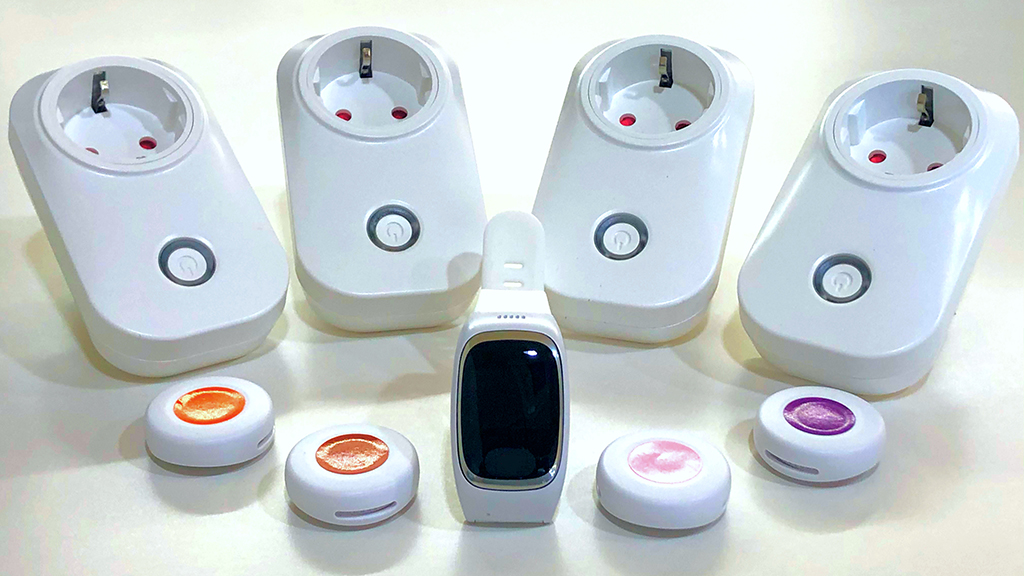A pioneering technology conceived to let elderly people live and grow old at home
SeniorDomo, a start-up promoted by the UOC, is collaborating with the Suara cooperative on a project in Barcelona to ensure 24/7 careThe project implements technology to monitor people who need help both inside and outside of their homes

Nine out of ten people would prefer to grow old in their own home rather than living in a retirement facility, according to various surveys. This has become even more pronounced during the COVID-19 pandemic. However, providing the conditions that allow these people to continue living at home can prove difficult at times. For this reason, a project in Barcelona by the Suara cooperative and SeniorDomo, a start-up supported by the Universitat Oberta de Catalunya (UOC), is developing technology to enable elderly people to continue living at home while receiving the care that they need.
Start-ups offering disruptive solutions
The not-for-profit cooperative Suara is well aware of this problem thanks to its almost 40 years of experience in caring for people at all stages of life and the more than 4,000 professionals it employs. Suara Lab, its social innovation laboratory, aims to make progress by incorporating all the potential that technology can bring us and to this end organized the Disruptive Homecare Startup Challenge.
"A number of start-ups offering disruptive solutions to transform the social and health care model were invited to participate. Following an intensive selection process, Suara chose two technology-based projects that offer innovative services to elderly or dependent people, with a special focus on the impact of COVID-19. SeniorDomo is one of these projects," explained Jordi Picas, director of innovation at Suara Cooperativa.
An easy-to-use technological solution
SeniorDomo offers an advanced telecare service for elderly people that provides continuous and preventive monitoring of users while respecting their privacy. It also allows them to get help inside and outside the home and instantly alert family members by means of an alarm on their mobile phones. The system consists of a hands-free watch, a series of sensors that are installed in the home and a mobile phone app.
"Compared to other telecare services on the market, SeniorDomo's technology provides 24-hour protection because it also works outside the home, is very affordable and can be installed at home by the family without the need for a professional. We have created an easy-to-use technological solution which provides peace of mind and security from the very beginning," said Ángel Puertas, founder of the company and holder of an Executive MBA in Entrepreneurship and Innovation from the UOC.
SeniorDomo is supported by Hubbik, the UOC's entrepreneurship promotion platform, and has received funding from Invergy, the University's investment vehicle. It was also one of the winning projects of the 2019 edition of the annual SpinUOC entrepreneurship programme.
Jordi Picas highlighted the reasons why Suara opted for SeniorDomo in the Disruptive Homecare Startup Challenge: "It is a mature and proven project that has evolved from idea to prototype. The team and the solution are multidisciplinary and have the capacity to bring great added value to families. It is a technological and digital solution designed to respond to a social challenge."
How does it work and what exactly does it offer?
But how exactly does it work, and what specific service could this Suara and SeniorDomo initiative provide? The project consists of providing the technological tools to further improve the care model. In addition to the watch, SeniorDomo technology includes a series of room presence and object movement sensors.
Thanks to these devices, the life habits of each user are recorded and determined, respecting their privacy because there are no cameras or microphones involved. When the system detects an anomaly, such as a user waking up later, not opening the fridge when they usually do or staying at home for several days when they normally go outside, the system sends a warning and Suara staff are able to check remotely that everything is OK. It is possible to see in real time, for example, the last time a person has walked, their pulse or blood pressure, as well as the evolution of other indicators. All of this makes it possible to find out if there is a problem without disturbing the user or having to send Suara staff to the house unnecessarily. If necessary, the system allows you to talk to the user via the watch.
The situation in Europe
Similar services have been in use in Europe for years, but in Spain we have traditionally opted for the so-called red button. This is a mechanism that elderly or dependent people wear around their necks which is reactive, not preventive. In other words, it is only activated when the user presses the button, and cannot detect on its own whether a risk situation has occurred. Another downside is that it does not work outside the home. The final price of the service offered by Suara and SeniorDomo in Barcelona is not yet known, but it will be around €20 per month.
This project supports Sustainable Development Goals (SDGs) 3: Ensure healthy lives and promote well-being for all at all ages, and 11: Make cities inclusive, safe, resilient and sustainable.
UOC R&I
The UOC's research and innovation (R&I) is helping overcome pressing challenges faced by global societies in the 21st century, by studying interactions between technology and human & social sciences with a specific focus on the network society, e-learning and e-health. Over 500 researchers and 51 research groups work among the University's seven faculties and two research centres: the Internet Interdisciplinary Institute (IN3) and the eHealth Center (eHC).
The United Nations' 2030 Agenda for Sustainable Development and open knowledge serve as strategic pillars for the UOC's teaching, research and innovation. More information: research.uoc.edu. #UOC25years
Experts UOC
Press contact
-
Editorial department
